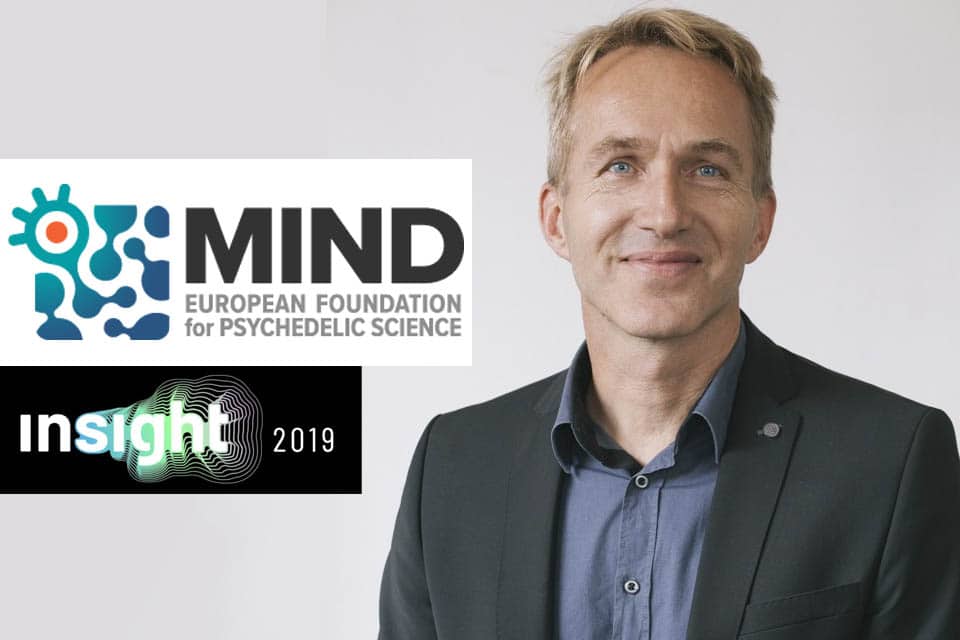
Dr. Henrik Jungaberle is the founder and executive director of MIND European Foundation for Psychedelic Science. In this conversation we discuss the cultural climate in Europe pertaining to psychedelics, efforts and resistance to mainstreaming psychedelics, what MIND is working on, and the upcoming conference in Germany, InSight 2019.
Thanks so much for speaking with us, Henrik. We haven’t had much coverage of the European side of the psychedelic movement, so I’m very excited to speak with you today. To start off, can you tell us about yourself and MIND?
I’m from Berlin and I’ve worked at the University of Heidelberg for 18 years. Two years ago I founded the MIND Foundation together with 26 people, and we’ve now grown to be an organization of about 270 members. It’s a charitable European organization based in Berlin, but we have people from Lithuania, Italy, Portugal, UK, The Netherlands and many other countries. At the beginning, we formulated a vision that we focus on in our work: establishing the psychedelic experience as a tool for personal and societal development. We have since developed a few studies without the direct use of psychedelics and are now part of a university network that works for starting a psilocybin depression study in Germany this year.
That’s awesome. Can you share a little bit more about that study?
There are a couple of psilocybin studies going on. Worldwide, we have 6 teams working on it in New York, Baltimore, in the UK, in Zurich and Basel, and hopefully soon we are going to start in Mannheim and Berlin. In this study, we intend to treat 100 people with severe indications of depression who couldn’t be helped with other therapies. So, like in other studies, we are going for the hardest section of the therapeutic spectrum. This is going to be the first study of its kind in Germany. Although we have a lot of things starting in Europe, Germany is one of the last in the queue and there are reasons for that.
Would you care to elaborate on some of those reasons?
I think there are a couple of such reasons. In the committees of the academic ethics boards, there still is a memory of those experiments that the Nazis did during the Second World War. Although that’s a long time ago, we have people who try to make sure that researchers are not wildly experimenting. Everywhere in academia here, psychedelics are not well understood. There might not be a deep understanding of how psychedelics work in some of these ethics boards.
Another factor in the German-speaking countries such as Germany and Austria is that we have quite a large underground therapy scene, and there have been some accidents and deaths in the last years, so the press has been disproportionately reporting a lot about that. So there is a public climate that still has to be balanced with information about the potentials and benefits weighed against the risks, and that is not widely happening yet.
Just two weeks ago, we succeeded in having a very nicely done newspaper article, which for the first time doesn’t focus on those underground cases, so that is already progress. Also, I don’t know if you ever thought about it, but a lot of drugs come from Germany or Switzerland, German-speaking countries. Things like heroin and methamphetamine have been developed here, that had a largely difficult impact on public health – so there is a certain skepticism in politics about drugs in general. Like anywhere, it’s also about a new generation filling the field and finding their place, and not being attached to the old narratives only.
Having said that, now a new generation is in politics and in academia and I can really feel that the psychedelic renaissance is just beginning to happen in Germany too. I’ve been in contact with a lot of researchers who are writing grants and writing science applications trying to start something.
That’s fascinating to hear. In the US, we’ve taken it for granted that the stigma and the public opinion has really shifted quite a bit. Almost every day now, we’re seeing news articles talking about psychedelics as the next breakthrough in mental health medicine, and there are virtually no reports of underground deaths or dangers.
Is that true for the whole of the United States or is that a California and San Francisco phenomenon?
The media is mostly based on the coasts and that’s where a lot of the media opinion is set, but I’d say it’s across the US. Of course, the more metropolitan areas you go into, the more likely people are to have heard about psychedelic science and the benefits. Interestingly, most of the concerns about over-exuberance and dangers have actually been raised from within the psychedelic community itself, because the press seems to be having a field day that this is the next big thing. It sounds like that’s not the case in Europe.
What’s also different between the United States and Europe or Germany is that you have more than 30 million people who have at least once taken a psychedelic in the United States. It’s about a tenth of that in Germany. So you don’t have that huge group of people with personal experience. That adds to the fragile public climate about that. And things do change: Michael Pollan’s book has been translated and published 6 or 8 weeks ago, so that’s also going to be a big success over here. Let’s see what happens.
Yeah, that book has been a game changer for sure. Half the people who reach out to us now start out with “I just read How To Change Your Mind…”
A lot of people in the addiction field here have read the book and now address me and invite me for talks and things. They say, “We didn’t know there were these new things going on in the field!” People who are not in a social media bubble with psychedelics aren’t confronted with this information all the time.
More and more in the US, people are feeling free to speak about their own personal psychedelic experiences, even though they were mostly illegal when they happened. It’s more common to hear “I took LSD and it changed my life” or “Mushrooms cured me of my depression.” How is the climate in Europe for people to be open about these things?
When it comes to mainstream TV or radio or newspaper, very few people have done that. I could count them with 10 fingers, and I was among them. What helped in my case is that I was for many years known as a prevention and harm reduction expert, so I have a voice in that field and that helps a lot in creating credibility.
Within our psychedelic communities and drug policy reform community, like over there [in the US] it’s pretty common to talk about your own experience. In academia at professional conferences of psychiatrists and other medical professions, I haven’t heard a lot of people speak about this. I’ve hardly ever heard anybody present subjective experience on the podium or in a talk. But something has changed since we organized conferences in the last years. We invited some philosophers and neuroscientists to speak, and they sometimes include the subjective experience. It’s a legitimization for people to talk about the structure of their own experience, the individuality and the commonalities in experience. There’s another group of public speakers building credibility, and these are philosophers like Chris Letheby from Australia. He has written a doctoral thesis about psychedelic experience and how you can philosophically understand it.
I recently connected with some people from Amsterdam where psilocybin truffles are legal, and they seem to have a quickly growing scene there. In the context of what you said about Europe being behind the US in mainstream acceptance, is The Netherlands seen as an outlier?
Things are starting to grow there, yes. That reminds me of a program that might be interesting to talk about. One thing that we created is workshop at the intersection of self-exploration, education and harm reduction: the workshop is called Beyond Experience. That workshop is addressed to people who either have psychedelic experience or are intending to dive into that soon, and it’s all about not only knowledge but experientially finding out what this is all about. We took the ACT theory (acceptance and commitment therapy theory) to that, and we are doing a lot of training about dealing with avoidance, letting go, acceptance, so that people can really make use of the psychedelic experience beyond just taking the drug. So it’s all about motifs and also competencies. That’s a focus of mine in research— that I’m trying to find out how to support people in developing the competencies to have sustainable effect. Because I don’t believe that it’s the psychedelic substance that make the effect. Psychedelics create an experience that might be received and interpreted in a certain way by a personality, and there are skills involved in that. And that is a paradigm we are just developing.
I thought of this because we have a Beyond Experience group in Amsterdam, and we have one in Berlin, and we’ll soon train people to get it out into other countries in Europe.
That’s great— preparation and integration are as important, if not more important, than the experience itself.
It’s on our horizon, too, to create an intersection between psychedelic treatment and addiction treatment. We’re just in the process of writing an ethics application to get things out into the academic world. Another difference between the US situation and the European situation is that in the States for many years, MAPS was the lonely wolf in the landscape, and now the universities are starting to conduct research— Baltimore, New York, and some others. In Germany and Europe, you have a growing number of universities that have started. There hasn’t been a strong organization like MAPS pushing it forward, so it began a little bit more though researchers, often connected to MAPS and the Beckley Foundation and other organizations, but who are still working in the academic field. And I like that, maybe because I’m an academic too, but I also like it because it provides a certain sense of integrating with the mainstream: bridging these experiences to the public, and translating what people experience there. Translating the new integration-based paradigm into the treatment of psychiatric disorders is extremely important I think, and not to just fall back into creating another bubble in society… So this is certainly something that we at the MIND Foundation are working on— to build those bridges.
I’d like to get into this concept of building bridges with the mainstream. Within the US, this has been a subject of debate. There are people who are all on board with MAPS— bring it into the mainstream, legalize it. We have for-profit companies entering the space now like Compass Pathways, who have been a little bit controversial for a few reasons. And there seems to be a vocal minority in the psychedelic community that says screw the mainstream, these substances should have always been legal, prohibition is terrible, and one of the great things these substances do is deprogram us from the imperialism and the social structures that are ruining the world. So there are some that are very against mainstreaming.
I don’t really share that view. I think that mainstreaming is great and necessary, and even though it will be imperfect, we have to do it in order to help people from a harm reduction perspective— and also just to start shifting consciousness, bringing more ecological awareness and so forth. So I’m curious if in Europe there is this same dichotomy, where some are against bringing these substances into the mainstream.
Very much so, and especially in Berlin. We have a leftist-socialist-anarchist scene here, and this is very much interwoven with psychedelic festivals and psychedelic parties, and you can hear that attitude a lot from there. My personal attitude— well, these groups very much stick among themselves; I don’t see that they are growing a lot, and I think it’s unethical not to bring some of these substances to patients or people who simply want to develop their lives. Also, I think that some people in those groups fighting for more radicalism often don’t see that it’s not the psychedelics that develop that radical attitude or environmental attitude, it’s only a glimpse of probability in the psychedelic experience that people experience connectedness, but then you have to make something of it.
It’s very improbable that a consciousness movement alone, without any technical changes or political changes in the larger sense, will save the planet— if it can be saved. It’s simply not quick enough. If you look at the numbers of climate change and the dying of insects and everything else, conscious change only coming from the bottom up will simply not do it. So that’s one of my arguments I bring to this field.
Having said that, I still think it makes a lot of sense to invite leaders in companies and in the political field to share this experience and explore another kind of thinking, another kind of relating to people— that makes a lot of sense to me. But I’m not simply hoping in a religious way for psychedelics to change the world. Does that make sense?
Yes absolutely, and I agree. I do have a level of belief that psychedelics can change the world, just looking at the generalized effects of the psychedelic experience: freer thinking, breaking down unhelpful patterns, increased environmental awareness and sense of connection with others. I have faith that as psychedelics and quality education about them reach more people, those generalized effects will become more common, and those are the shifts in attitudes and perspectives that we need in order to create an environment in which people are more supportive of the actions we need to take.
Using the language of Tim Leary or Ralph Metzner from the 60’s like “deprogramming” might not really be helpful in terms of finding out what people really need to create real change after a psychedelic experience. There are a lot more factors to change than consciousness, such as relationships, community, equal opportunities, and so on. There are also a group of people who simply withdraw from the political and societal game of building a valuable society worth living in. They just take the inner way and don’t balance this with building something on the outside.
Speaking of building something on the outside, tell us about your upcoming psychedelic conference InSight 2019 and any other projects you’re working on at MIND.
We’re making a very special conference on September 5-7 here in Berlin. It’s a pretty academic conference and we’re also bringing a lot of people in from fields not often related to psychedelics, following our path of bridging to mainstream society. I’ve been to many psychedelic conferences and I found that some of them are extremely beautiful, and I‘ve met wonderful people, but in terms of telling a story to people in more mainstream institutions, they have not been very successful. So we’re trying to change that with our conference in Berlin.
I think at MIND we are pretty much trying to build structures top down for people who want to do bottom up work. That’s why in our organization we organize in committees and provide people with structure, digital systems and conceptual structures and invite people to create projects. I think that really starts to be very fruitful. We had a number of papers written that come from a more public health perspective, not only focussing on therapies, but also addressing self-development and harm reduction (e.g. Positive Psychology and Psychedelics), and people are starting to change their methods of harm reduction at festivals in a pragmatic sense.
What I also like is that we are not just going the German way. From the beginning we said, “We are Europeans. We are living in a world where people are traveling and building identities beyond their nation state.” That’s what I like about this approach of people coming together. It surprises me that for a workshop or event, people are flying in from Lithuania or Lisbon or other places. It’s amazing, and it makes us so happy.
We are very grateful to Henrik for speaking with us and sharing his perspectives on the European psychedelic renaissance. You can visit the MIND website here, Henrik’s personal website here, and learn more about InSight 2019 here.










